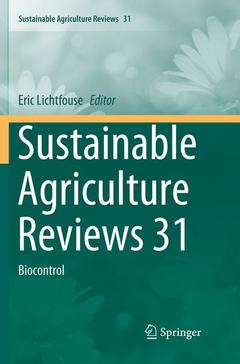Description
Sustainable Agriculture Reviews 31, Softcover reprint of the original 1st ed. 2018
Biocontrol
Sustainable Agriculture Reviews Series, Vol. 31
Coordinator: Lichtfouse Eric
Language: English
Keywords
Weeds; Fungi; Ecology; Herbicides; Plant Disease Management; Worms; Microbes
Publication date: 01-2019
Support: Print on demand
Publication date: 10-2018
Support: Print on demand
Description
/li>Contents
/li>Comment
/li>
This book presents advanced ecological techniques for crop cultivation and the chapters are arranged into four sections, namely general aspects, weeds, fungi, worms and microbes. Biocontrol is an ecological method of controlling pests such as insects, mites, weeds and plant diseases using other organisms. This practice has been used for centuries. Biocontrol relies on predation, parasitism, herbivory, or other natural mechanisms. Natural enemies of insect pests, also known as biological control agents, include predators, parasitoids, pathogens, and competitors.
Chapter 1. Ecological intensification in Asian Rice Production Systems.-
Chapter 2. Transhumance, livestock mobility and mutual benefits between crop and livestock production.-
Chapter 3. Weeds, herbicides and plant disease management.-
Chapter 4. Ecological methods for weed management.-
Chapter 5. Effect of Agricultural Chemicals and Organic Amendments on Biological Control Fungi.-
Chapter 6. Ecology, population biology and management of chilli anthracnose.-
Chapter 7. Nematode Parasites of Grapevines.-
Chapter 8. Behavioural ecology of Steinernema and Heterorhabditis, entomopathogenic nematodes for insect biocontrol.-
Chapter 9. Beneficial soil microbiome for sustainable agriculture production.-
Chapter 10. Chemotaxis behavior of Pseudomonas species and biodegradation of pollutants.
The book (and series) is a state of the art on the latest research in sustainable agriculture
This book series gathers review articles that analyze current agricultural issues and knowledge, and then proposes alternative solutions
It covers multidisciplinary topics and therefore help all scientists, decision-makers, professors, farmers and politicians who wish to build a safe agriculture, energy and food system for future generations
These books may interest you

Predators and Parasitoids 71.13 €



